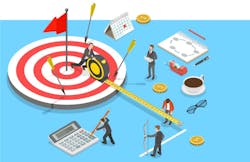The landscape of the automotive industry has changed drastically. Vehicles, which were once viewed as a status symbol and were only accessible to the elite, are now a necessity for most households (although, with rideshare options, that trend seems to be coming into question). Careers in the automotive industry, which were once sought after and viewed as a reputable trade, have now become more difficult to fill with four-year college degrees viewed as the only option for most students.
However, this trend has coincided with another—the advanced complexity of vehicles. These constant changes in the structure and technology of vehicles require training and constant equipment updates. With information more accessible than ever, today’s customer is more knowledgeable than ever before, which means customer service and creating trust is more important now than it ever was.
Those are just a few examples of how the landscape has changed. The industry constantly ebbs and flows and, in order to be successful, body shops need to constantly evolve and re-evaluate their processes in order to stay relevant.
Faulkner collision repairs have been in business for over 80 years. Faulkner collision repair of Lancaster is the collision repair center for BMW of Lancaster in Lancaster, Pa. The collision repair center recently was awarded the On Your Side Showmanship of Excellence Award by Nationwide Insurance for it customer service and community involvement. The collision repair center ranked first out of 4,500 collision repair centers in the country.
It’s not luck that has allowed this collision repair center this type of longevity. Faulkner collision centers has continued to evaluate what’s working —and what’s not—and look to the future to find ways to remain relevant. Here are a few ways that the MSO has adapted to stay relevant.
Offer a career path.
Nowadays, technicians are at a shortage, making it essential for businesses to find ways to attract quality candidates. One way to do that is to offer a clear career path rather than just offering a “job.”
April Lausch, collision repair manager of Faulkner Collision Repair of Lancaster, has promoted 60 percent of her staff. In fact, the only time she doesn’t hire from within is when she needs to fill the position of someone that she’s promoting.
When she adds someone to the team, she sits down with them and creates a path for them.
“Wherever you want to go, I will take you there,” Lausch says to her employees.
Lausch recognizes that she is only as good as her team, so she needs to provide them with the resources and opportunities for them to be able to shine.
“I have some serious rockstars,” Lausch says of her team.
Value your customers.
Through the years, one aspect that has stayed consistent is the need to keep customers happy.
“The customer will always want to be pampered and heard,” Lausch says.
Customers are people—not numbers. Be mindful of the way that your staff communicates with customers. Do they interact with a customer the way they would want members of their family treated? If not, that needs to change.
Remember, most customers that come in are not excited about the experience—especially in collision repair.
“You have to have compassion,” Lausch says.
Stay in touch.
Today’s customer wants to be informed. Keeping them informed about where their vehicles are in the repair process is essential. Taking advantage of evolving technology is one way to do that.
Lausch texts her customers once per day to keep them informed on the status of their vehicle—something that they weren’t doing five years ago. Bryant also texts his customers throughout the process through his management system. He also makes sure to contact the customer within 24 hours of the pick up to make sure everything went smoothly and that the customer was satisfied with everything. He then tops if off with a thank you note as one last opportunity for the customer to let him know what they thought of the experience.
Update equipment.
“With aluminum and carbon fiber, vehicles are more and more difficult to repair,” Lausch says.
Lausch makes equipment a priority. It is, after all, a requirement to obtain a certification.
“You have to keep up with equipment,” Lausch says.
A lot of shops, she explains, just don’t have the equipment to take in vehicles, which costs them customers. It doesn’t make sense—and isn’t possible—to purchase every piece of equipment for every vehicle; do research and figure out your customer base and make decisions on what to invest in based off of that.
Equipment is a passion of Lausch’s. She says that staffing and equipment are the key to her success. When Lausch took over nine years ago, the collision repair center wasn’t BMW certified, but she wanted to change that. In 16 months, the body shop obtained the certification, through lots of long hours, flying back and forth to get more information and training, and equipment purchases.
Key Questions to Ask
Customers that have just been in a collision are especially vulnerable, which is not lost on April Lausch, collision repair manager for Faulkner Collision of Lancaster. Don’t treat it like a business transaction—ask these key questions before anything else:
Are you OK?
Were your children in the car with you? Are they OK?
If there were any young children in the car, check and see if there was a car seat and, if it was impacted, help them get that figured out, Lausch explains.
With collisions, every experience is different so the script needs to be adjusted, but remember that the well-being of the customer and anyone else that was involved in the accident is priority and that is what should be addressed first, Lausch says.

